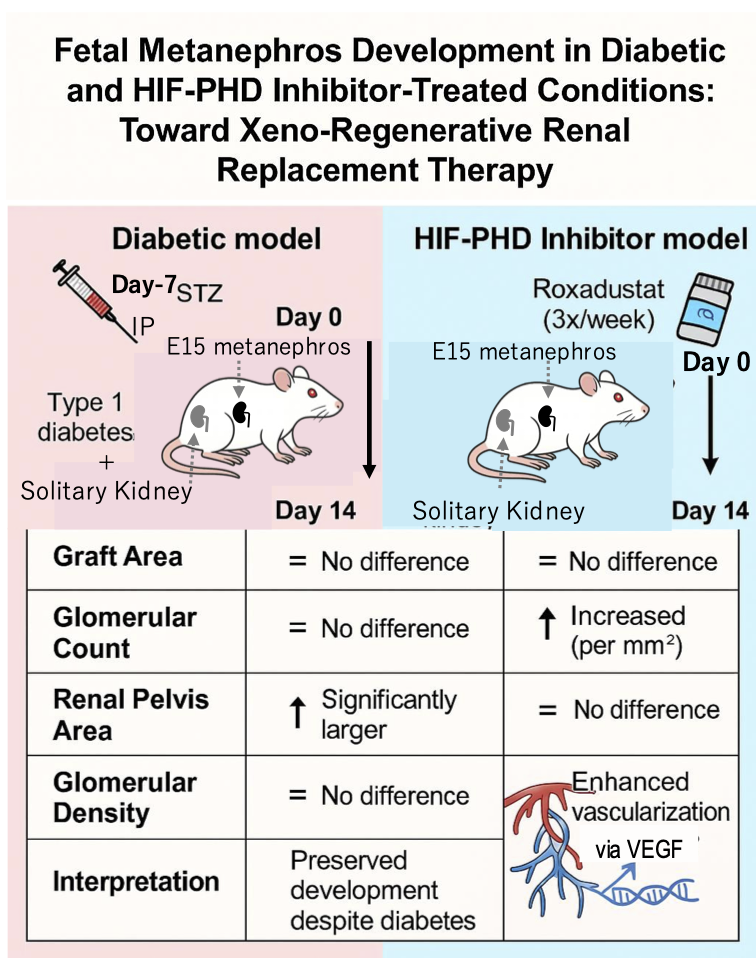Fetal metanephros development in diabetic and HIF-PHD inhibitor-treated conditions: toward xeno-regenerative renal replacement therapy
Nagisa Koda1, Kei Matsumoto1, Takumi Ikeda1, Hinari Ohashi1, Takafumi Kuroda1, Shutaro Yamamoto1,2, Keita Morimoto1, Yoshitaka Kinoshita1,3, Yuka Inage1,4, Yatsumu Saito1, Shohei Fukunaga1, Toshinari Fujimoto1, Susumu Tajiri1, Shuichiro Yamanaka1,5, Takashi Yokoo1.
1Division of Nephrology & Hypertension, Department of Internal Medicine, The Jikei University School of Medicine, Tokyo, Japan; 2Department of Urology, The Jikei University School of Medicine, Tokyo, Japan; 3Department of Urology, Graduate School of Medicine, The University of Tokyo, Tokyo, Japan; 4Department of Pediatrics, The Jikei University School of Medicine, Tokyo, Japan; 57 Kidney Applied Regenerative Medicine, Project Research Units, The Jikei University School of Medicine, Tokyo, Japan
Background: Chronic kidney disease (CKD) affects over 800 million people globally, with a prevalence of approximately one in ten adults. Progression to end-stage renal disease (ESRD) requires dialysis, which severely impairs quality of life and imposes a significant socioeconomic burden. Although kidney transplantation is the only curative option, the global shortage of organ donors prevents the majority of ESRD patients from receiving one. Creating transplantable kidneys using xeno-regenerative medicine—combining regenerative biology with xenotransplantation—holds promise as a transformative solution. We aimed to assess whether transplanted fetal metanephroi could (1) develop normally regardless of disease state and (2) grow more effectively in optimized environments relevant to CKD patients.
Methods: Two experimental models were established using adult Lewis rats:
(1) Diabetic model: Type 1 diabetes was induced by streptozotocin (STZ) injection on Day -7. On Day 0, embryonic day 15 (E15) fetal metanephroi from Lewis rats were transplanted into the para-aortic and omental regions, and a unilateral nephrectomy was performed. Grafts were harvested on Day 14.
(2) HIF-PHD inhibitor model: E15 fetal metanephroi were transplanted similarly into rats that underwent unilateral nephrectomy on Day 0. The recipients received oral Roxadustat (a HIF-PHD inhibitor) or placebo three times weekly. Grafts were evaluated on Day 14.
Results:
(1) In the diabetic group, graft area and glomerular count were comparable to controls, indicating normal growth despite systemic hyperglycemia and chronic inflammation. Notably, the renal pelvis area was significantly larger, suggesting increased urine production.
(2) In the Roxadustat-treated group, graft size remained unaffected, demonstrating no adverse effect on metanephros development. However, glomerular density (glomeruli per mm²) was significantly increased, suggesting enhanced vascularization potentially mediated by VEGF upregulation.
Conclusion:
Fetal metanephros transplantation is feasible and effective under both diabetic conditions and HIF-PHD inhibitor treatment. These findings support the compatibility of clinical CKD environments with metanephros development. The observed enhancement in glomerular density implies improved vascular invasion, which will be further assessed through VEGF expression analysis and vascular visualization in cleared metanephroi.

The author received a research grant from the Japan Kidney Association / Nippon Boehringer Ingelheim Joint Research Program in FY2021.. The author received a research grant from Eli Lilly Japan K.K. Innovation Research Grant Program in FY2023..
[1] Chronic Kidney Disease
[2] Metanephros Transplantation
[3] Regenerative Medicine
[4] Diabetes
[5] HIF-PHD Inhibition
[6] Vascularization
[7] Glomerulogenesis
[8] Fetal Organ Development